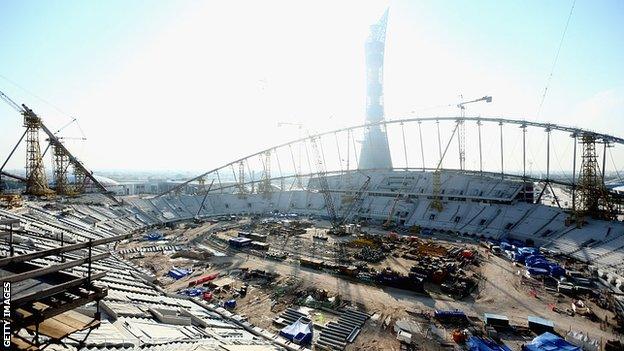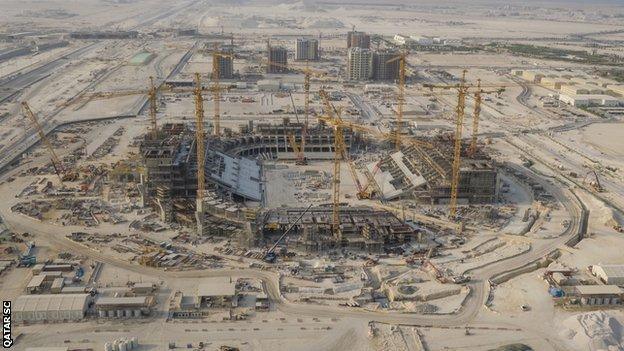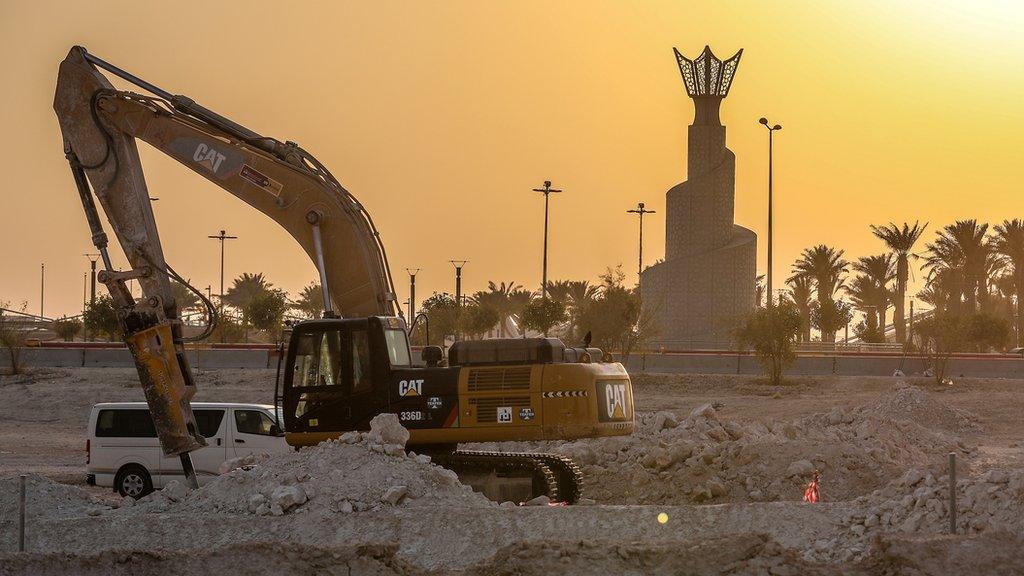World Cup 2022: Qatar still failing to protect workers' rights, says Amnesty International
- Published

Qatar has imported hundreds of thousands of construction workers for the 2022 World Cup, with seven new stadiums being constructed specifically for the tournament
Workers in Qatar continue to be mistreated despite promises to improve rights ahead of the 2022 World Cup, Amnesty International says.
A new report from the human rights group says thousands of workers are going unpaid.
It adds that a new commission set up to help improve workers' rights is failing to protect them.
Amnesty has urged Qatari authorities to "end the shameful reality of labour exploitation".
"Despite the significant promises of reform which Qatar has made ahead of the 2022 World Cup, it remains a playground for unscrupulous employers," said Stephen Cockburn, Amnesty International's deputy director of global issues.
"Migrant workers often go to Qatar in the hope of giving their families a better life - instead many people return home penniless after spending months chasing their wages, with too little help from the systems that are supposed to protect them."

The 80,000-seater Lusail Stadium will host the opening match and final
The report, All work, no pay: The struggle of Qatar's migrant workers for justice, cites the example of "several hundred" contractors who were forced to "return home penniless" after the companies employing them first stopped paying them then ceased to operate.
Amnesty's research focused on firms not directly related to the World Cup.
Qatari authorities passed new laws to improve workers' rights after signing an agreement with the United Nations' International Labour Organisation in November 2017.
Those changes included ending the labour sponsorship system that forced foreign workers to seek their employer's permission to change jobs or leave the country.
New legislation also introduced a temporary minimum wage, created a workers' insurance fund and set up committees to address disputes.
"Qatar has made substantial progress on labour reforms," a government statement said.
"We continue to work with NGOs, including the International Labour Organization, to ensure that these reforms are far-reaching and effective. Any issues or delays with our systems will be addressed comprehensively.
"We have said, from the outset, that this would take time, resources and commitment."
However, Amnesty's latest report states that several hundred migrant workers employed by three construction and cleaning companies were forced to return home without being paid.
Responding to Amnesty's report, world football's governing body Fifa say they take "World Cup workers' rights very seriously" and in line with its human rights policy.
"We would like to note that, as confirmed by Amnesty International, the report does not concern World Cup sites. The Supreme Committee for Delivery & Legacy has also confirmed that the contractors referenced in the report have never been engaged on World Cup projects in Qatar," Fifa said in a statement.
"We however acknowledge the importance of the new labour dispute committee as an important part of the broader labour rights reforms taking place in Qatar. We know that the Qatari authorities are working intensely in collaboration with the International Labour Organisation and other stakeholders with a view to further improve the effectiveness of this complex but vital mechanism.
"Fifa continues to engage with the Supreme Committee for Delivery and Legacy and other parties towards ensuring respect for the rights of workers who are involved in Fifa World Cup-related activities. Whenever an issue is identified within that scope, Fifa follows-up with its Qatari counterparts through the appropriate channels."
- Published6 February 2019

- Published26 September 2018

- Published16 February 2018
